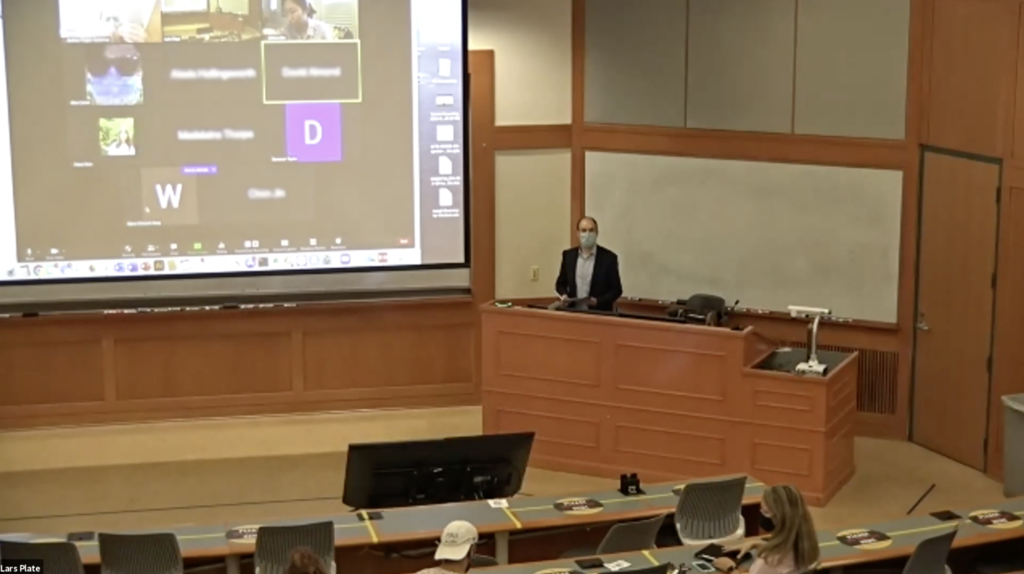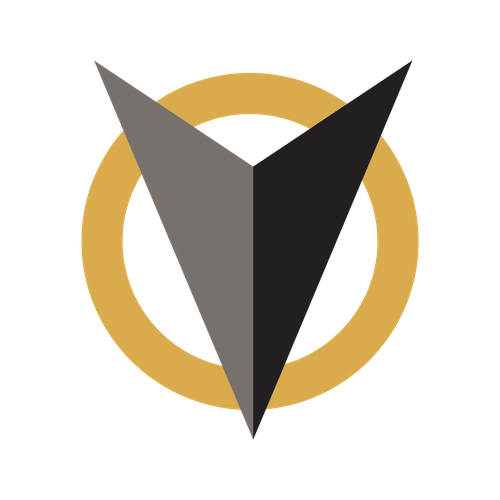Written by Minna Apostolova
Teaching classes during the pandemic is a significant challenge, but Vanderbilt professors like Dr. Lars Plate have been adapting to craft the most engaging and meaningful academic experiences possible for their students. This semester, students in Dr. Plate’s Bioorganic Chemistry course (CHEM 3710) were tasked with creating thoroughly-researched and in-depth informational websites on some of the most prominent candidate and clinically-proven COVID-19, HIV, and Hep-C antiviral drugs, including Remdesivir, Darunavir, and Simeprevir. You can view the culmination of their work here.
I also spoke to Dr. Plate about his academic journey and his thoughts on the state of science today.
———————————————————–
Vanderbilt Vanguard (VV): Thank you so much for taking the time to talk to me today. I want to start off by asking you to tell us a little bit about your research career and what brought you to Vanderbilt.
Dr. Plate: Sure. I started at Vanderbilt about a little over three years ago. Before that I was a postdoc at the Scripps Research Institute in San Diego, and before that, I did my Ph.D. at the University of California at Berkeley. I grew up in Germany and moved to the US for college where I became really interested in biochemistry which uses the power of chemistry to understand fundamental biological processes. I became interested in enzyme function and protein structure function during my Ph.D., and in my post-doc I realized I was interested in the bigger picture and regulation of cell processes, in particular protein folding and protein quality control. Now in my lab, we work on understanding how protein interactions control protein folding and assembly pathways. We’re also looking at how these processes are involved in viral infections: that’s a new avenue we’re exploring in my research group.
How did you find what you were interested in during undergrad? Did you have an “aha” moment or was it more of a gradual process?
Well, it was a little bit of both. I did a lot of exploration in my freshman and sophomore years because I really didn’t know what I wanted to do. I had two different research experiences totally unrelated to chemistry, the first one being in Linguistics because I enjoy languages as well. But in my sophomore year, when I took biochemistry, the class I teach now (BSCI 2520), I realized you can look at biology through a chemical lens, and that was super fascinating. Also, the professor I had in undergrad was pretty inspiring, and I ended up working with her research group. That opened me up to the world of research. That was a really critical experience for me.
It sounds like mentorship was really important to shaping your career. Do you have any advice for students looking to find mentors in college?
Yeah, that’s a really great question. I think mentorship is absolutely key, and I consider myself super lucky that I just stumbled into situations where people offered mentorship without me asking. I’m still relatively introverted, and it’s tough for me to ask for advice. During my undergrad studies, I did not know that all professors and faculty actually have students’ best interest at heart. I wish I had taken advantage of opportunities to develop relationships with more professors and not been so shy. So, in retrospect, my advice would be to take advantage of opportunities to get to know professors and just have curious conversations with them.
Thank you for sharing that. Hopefully that will resonate with students reading this interview! After that wonderful background, I wanted to pivot and talk about some of the issues facing science today. Based on your experience, what are some of the biggest challenges facing the scientific community?
Well, that’s a really grand question but it’s great, though! I would say two things. The first big thing is creating connections to non-scientists and outreach and communication. We have to make sure that we’re not living in our silos doing research, but actually keeping in mind that those discoveries are benefiting people, humanity, the environment, or all of the above. The next thing is that we have to be able to communicate science to people and make everyone else buy into it. And that relates to building trust and building an understanding of what scientists do. Something that can help with that is just increasing inclusion and diversity in research participation. I think we’re on our way to making that happen but by and large there is still a huge underrepresentation of people from diverse backgrounds, whether it’s racial or socioeconomic minorities, or gender imbalances, especially in upper-level positions. I think that’s something that needs to be remedied. As we train the next generation of scientists, like you all in college, those inequities need to be dealt with. And that increases outreach opportunities and builds trust in science.

The pandemic has shown us how important scientific communication and trust in science are. How do you think we as undergraduates can help communicate science and fight misinformation, given that we’re still trainees ourselves?
It starts with just learning to evaluate information. The knowledge you’ve gained from textbooks is in there because it has been researched over a long period of time. All that knowledge started as a hypothesis that’s been tested to develop new theorems or models. So, don’t take knowledge for granted. And now, as we are exploring a new disease and trying to understand how it can cause all this damage, why it’s so detrimental, and why it spreads so rapidly, understanding that we didn’t just “magically” gain all this information is important.
Plus, you’re in a really great situation where you have connections to your family and communities back home. You have avenues through which you can reach out to people, and that’s really important. And if you have access to science journals like this, that’s just extra icing on the cake. Speaking from experience, science communication takes practice, and it’s a continual learning process.
I think those are all good points for us to keep in mind, especially as we’re continuing to talk to family and friends about COVID. Moving on, recently the Scientific American endorsed a political candidate for the first time in the journal’s history. Typically, academia has tried to stay impartial and isolate itself from politics, but how can we fight misinformation while staying apolitical in this divisive era?
In an ideal situation, science should not be politicized, but as in other parts of the world, there is one party in the U.S. that is more prone to spreading misinformation and undermining the scientific process. Now being in a leadership position in my lab, I have to find funding for my students and trainees, and clearly, I have seen members of a particular political party propose to slash funding to research agencies and restricting what kinds of research we can conduct. That all undermines scientific progress, so when it comes to it, we as scientists should speak up and take a stance when our limits are crossed.
Do you see a significant difference between attitudes towards science and COVID in the U.S. versus in other parts of the world?
Yes, I stay in touch with my family in Germany, so that’s the best perspective I can provide. I think generally the biggest difference comes back to education. Because of the more “egalitarian” school system in many countries in Europe like Germany, there are fewer discrepancies between public and private schools, so the general education levels are a little more uniform. I think that leads to people being generally more informed, feeling a greater sense of obligation to their community, and being more receptive to expert guidance, and we’ve seen that in the European response to the pandemic. Regardless, there are still anti-mask and anti-lockdown protests in Germany, so these sentiments are definitely not unique to the U.S.
I think that your emphasis on foundational education is really important; do you have any recommendations on how we can advocate for education in our own communities?
I would say get engaged with your high schools, if you still have a connection. Go back and talk to students and share your experiences. I have actually gone back and done some presentations at my high school, and I really want to get engaged in something similar in Nashville. Exposing high school students to research is really important.
Thank you for that encouragement! Well, here’s a broader question: what advice do you have for students struggling to find research opportunities during COVID?
I’ll start by saying that faculty members are aware that this is a pretty big problem, and we are really trying to create opportunities for students, whether it’s through research projects or through initiatives. I’d say exploring computational studies is a good use of time. But also just reading scientific literature is really important. Reading papers is time very well spent. If you’re not used to it, it can be very tough, but you will get better with practice. So realize that developing these basic skills is a really valuable use of time.
Now, I want to move on to highlighting the wonderful work students put into creating the website we’ve linked to above. Why did you think it was important for students to be engaged in the viral drug website development project and why should we be sharing it with the public?
I thought it was really important that we do an activity this semester that is not just for the sake of gathering information. That’s what class projects, especially in biochemistry, tend to be. Also, you don’t really get to disseminate them, unless you publish them. When I was making adjustments to the syllabus over the summer, I thought the websites would be a great way for students to more quickly publicize their findings on the small molecule antivirals. This project was particularly timely with the pandemic, aligned with my particular research interests, and really tied in well with the materials we were covering, like enzyme mechanisms and inhibitors.
And from the student perspective, I think learning how to build a website is a really valuable skill. It’s a non-scientific competency, but it’s important. An eye-opening experience for me was building my lab’s website. I think I’m a pretty technologically adept person, so I thought I should easily be able to build a website. But, I had to learn how to present information in an appealing way through the process. My lab members helped me with it. It made me realize that students should also be able to do that.
I was really blown away by what all the different groups put together; it was beyond what I had expected. They combined great information with well-done visuals. So, I really wanted to make these platforms more broadly available.

